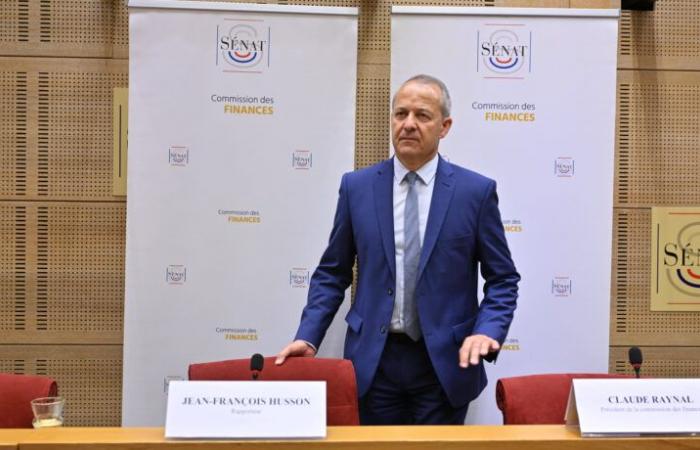It’s not a win. As Michel Barnier’s general policy speech approaches, this Tuesday 1is October, everyone in the camp of the former presidential majority is increasing the pressure, with the question of tax increases at the heart of the debates. The Prime Minister finds himself caught between everyone’s red lines, further complicating an already arduous task.
In an interview with the Journal de Saône-et-Loire, Michel Barnier made himself clear: “We are going to appeal, exceptionally and temporarily, to those who can contribute to this effort,” he announced. If we have to wait for the announcements, Le Monde already gives the clues: a levy of 8 billion euros on large companies, via a corporate tax surcharge, the tax on share buybacks, which was already in the cards of the former majority, an increase in the automobile eco-tax or even a tightening of taxation on furnished accommodation such as Airbnb.
Gérald Darmanin puts pressure on Michel Barnier
Nothing that goes without saying. The subject of taxation has been at work for several days in the “central bloc”, which brings together Renaissance, Modem and Horizons. If they support the Barnier government – they are members – it is not with their eyes closed. Michel Barnier has a few friends who wish him well… to the point of opposing him.
For his political comeback, the Minister of the Interior, Gérald Darmanin, did not pull any punches. “I know that many of us will not be able to support a government that would increase taxes,” warned the former Minister of the Interior, while launching his think tank, called “Popular”. He is not the only one. In a column published in La Tribune, 27 Renaissance deputies from the Ensemble pour la République group, and not the least, make the same speech. “It seems to us […] unthinkable that after seven years of tax cuts it is the alliance of the central bloc which ends up giving up fiscal stability to increase them”, maintains the deputy Mathieu Lefèvre, with the former ministers Aurore Bergé and Marie Lebec or the former group president Sylvain Maillard.
“Pitiful and appalling”
Still, the subject is debated among government supporters. “And if there are tax increases, what will they do, will they vote for censure? » asks a Renaissance executive, who is surprised by the tone of the warning and who prefers to “avoid reacting to the peremptory declarations of the weekend”. The same person thinks that “we will have to” fix things. “I hear more from the communications, than from definitive positions,” slips this parliamentarian. Another, classified on the right, also sees an element of posture. He appreciates the pressure from Gérald Darmanin even less. “It’s just pitiful and appalling. The acting and the charade consisting of pulling each other’s punches and then reconciling, the French see that clearly,” says this elected official.
A senator from the former presidential majority is waiting “to know the proposals” before deciding, not wanting “to make a trial of intentions”. But he wonders. “If someone tells me about tax increases via share buybacks, energy companies, I say why not. But, when he speaks of “those who can contribute”, who are “those”? »
On the other side of this big family, at Modem, which already defended a tax on corporate superprofits, we are ready to follow. “We are not closed to asking efforts from the richest people – at the highest brackets – and from very large companies, through an exceptional contribution. We are, moreover, ready to tackle tax loopholes, to analyze annuity situations, to cancel planned tax cuts, such as the contribution on the added value of companies,” argued in Ouest France the former Minister Marc Fesneau, today at the head of the Modem group of deputies.
“Make no mistake, the answer to the deficit is not fiscal”
Among the Renaissance deputies, we intend to contribute to the debate. Already by “putting the town hall back in the middle of the village”, as MP David Amiel says. “Make no mistake, the answer to the deficit is not fiscal. We have somewhat lost the sense of orders of magnitude. Ultimately, we must reduce the deficit by 110 billion euros. Obviously, you are not going to find them through taxation. This is more than the entire income tax. So we need to make savings in public spending,” said the deputy from the Assembly’s finance committee.
The Paris MP also sets his limits: “If there are tax increases which I consider to weaken our economy, I will vote against,” warns David Amiel, “very hostile to the tax increase on income. Same thing for companies: “I am very hostile to the increase in corporate tax, even if it concerned large companies, especially since they are the ones who tend to relocate,” warns this close to Emmanuel Macron, who “finds it demagogic to want to target them”. Same opposition to any “increase in charges”. If the one who led an information mission on superprofits finds it “legitimate to question certain rents”, he adds:
David Amiel proposes “a tax net, with a minimum amount of tax that we ask of the richest”
David Amiel, on the other hand, is “in favor of the tax on share buybacks, the fight against tax optimization or the cleaning up of a certain number of tax loopholes, where I have no difficulty”. This former Elysée advisor mentions in particular “a debate that there will be on the Dutreil pact (which allows the transfer of a company with a large tax exemption, editor’s note). It’s not about removing it, it’s very useful in protecting our businesses. But we know that there can be a certain number of misappropriations or abuses.”
As for taxation on the very rich, David Amiel has his own ideas on the subject. “Rather than increasing taxes, which are being circumvented, we can ensure that those who are asked are paid better,” imagines MP Renaissance. Deeming it “intolerable” that “some very rich pay 2% of their real income in taxes”, he puts a proposal on the table. “I invite us to think about a tax net, by having a minimum amount, a net, that we ask of the richest, to ensure that there is no abuse of the system. This is an avenue that seems important to me,” says David Amiel. With a view to a possible amendment during the budget, he is currently “technically working” on the subject, but the question is “a little complicated”.
“We have identified more than 130 actions likely to reduce public spending,” explains Jean-François Husson
Among the LR, who support the Barnier government, the question of taxation is not obvious either. Especially for a political family whose DNA is more about advocating lower taxes. But the debate also exists.
In the Senate, for the general budget rapporteur, Jean-François Husson, the first objective is to make savings. Its services are working on the subject with a view to the finance bill. “We have identified more than 130 actions likely to reduce public spending. We did a lot of in-depth work,” explains the senator from the LR group. He recalls in passing that the senatorial majority “voted last year for 7 billion euros in savings. The government said now was not the time. So we will look to try to go further.” He adds: “I favor reducing public spending, wherever we can do it, it must be a reflex.”
“Rather than being stubborn, narrow-minded, I prefer to say, we will look”
What about tax increases? “France is still a leader in terms of levying taxes,” begins by recalling the general rapporteur of the budget. But he doesn’t close the door yet. “If we find enough billions saved, without having an increase of any kind, so much the better. But I’m not sure that within the given time frame, that it would be possible. Rather than being stubborn, narrow-minded, I prefer to say, we will look,” says Jean-François Husson. In other words, “this question (tax increases) only arises once we have taken an inventory of the savings”. To be clear, he adds: “On the question of taxation, I have no red line because I consider that we must hear, listen to everyone, to have a constructive and fruitful dialogue. My objective is to redress the situation and gradually straighten out the accounts.”
Concretely, Jean-François Husson gives an example of a possible tax increase, which would in reality be the end of an exceptional tax reduction. “The TICFE (domestic final consumption tax on electricity) was lowered at the time of the energy crisis. It was agreed to return to normal. But we’ve only gone part of the way. Taxes must return to the level they were at before the crisis,” argues the senator from Meurthe et Moselle, who asks: “Can we continue to give gifts, without looking, without counting? No “.
“Everyone knows it will end with a 49.3”
Another avenue: the tax on superprofits. While the senatorial majority had rejected it until now, during the debates, this year, the rapporteur is not closing the door. “I’ll look.” I don’t put a lock on it,” says Jean-François Husson, who on the other hand warns against “symbols” on the richest. Enough to allow a robust debate, with a view to the finance bill, but on condition that it is open, hopes the rapporteur: “If everyone comes with a thousand and one red lines, you are not moving forward”. There remains one outcome, as mentioned by a parliamentarian from the central bloc and increasingly mentioned off the record: “The debates are going to be very difficult, because everyone knows that it will end with a 49.3. It seems impossible to do otherwise.”






